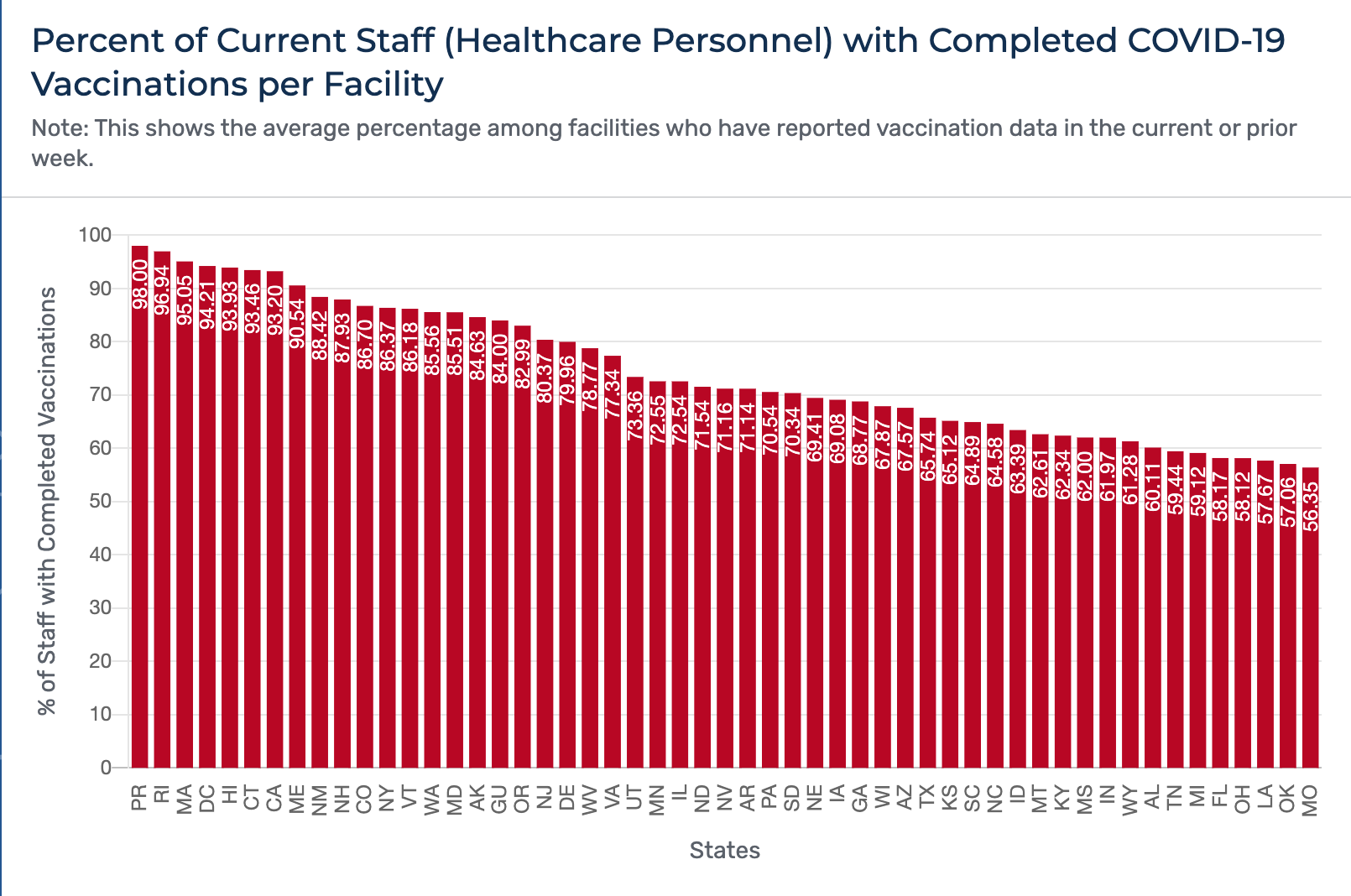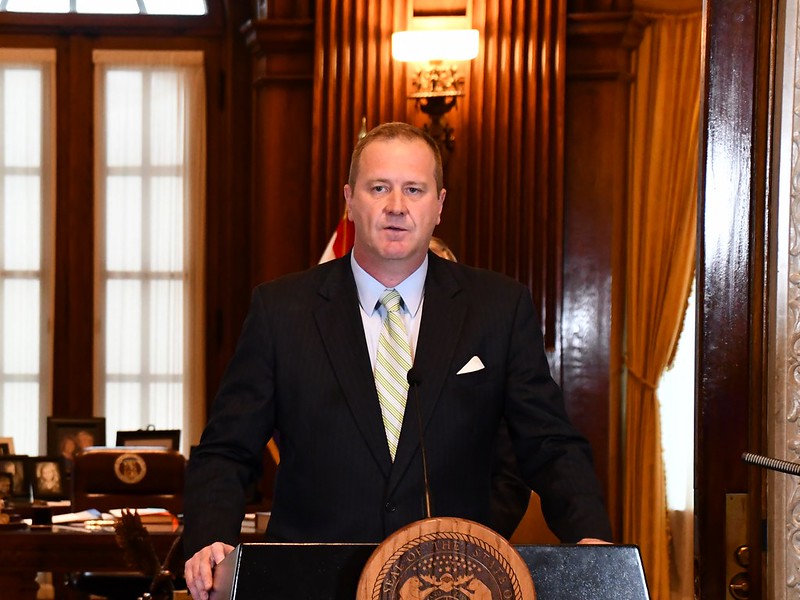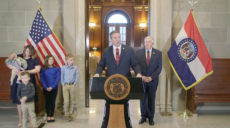As soon as the new federal vaccination rule for large employers is published this week, Attorney General Eric Schmitt will file a lawsuit in an attempt to halt it, his office said Thursday morning.
The Biden administration unveiled two new, albeit expected, COVID-19 vaccination requirements for workers earlier Thursday.
The rule from the Department of Labor’s Occupational Safety and Health Administration (OSHA) requires employers with at least 100 workers to ensure they are fully vaccinated against COVID-19 or submit to weekly tests by Jan. 4. Employers must require unvaccinated employees wear a face covering and provide paid time off for workers to get vaccinated and recover from side effects by Dec. 5.
Additionally, the Centers for Medicare & Medicaid Services (CMS) is requiring all health care workers, clinical and non-clinical, under Medicare and Medicaid programs to be fully vaccinated against COVID-19. Like the OSHA rule, the deadline for health care workers to be fully vaccinated is Jan. 4, and exemptions will be permitted for people with medical or religious reasons, a senior administration official told reporters this week.
Both rules will cover about two-thirds of the workforce in the country, according to the White House.
“Vaccination requirements are good for the economy. They not only increase vaccination rates but they help send people back to work — as many as 5 million American workers,” President Joe Biden said in a statement. “They make our economy more resilient in the face of COVID and keep our businesses open.”
The administration previously announced vaccination requirements for federal employees and contractors. Schmitt is leading a multistate effort to challenge that requirement, and Gov. Mike Parson issued an executive order allowing state employees to forgo the vaccine for religious or health reasons.
And Schmitt was quick out of the gate to promise a legal challenge against the workplace federal vaccine requirements Thursday as well.
“The federal government does not have the authority to unilaterally force private employers to mandate their employees get vaccinated or foot the bill for weekly testing,” Schmitt said. “I’ve been in discussions with businesses in Missouri, including a trailer manufacturing company in mid-Missouri, who say that this vaccine mandate will crush their business.”
“We will be on file first thing tomorrow morning to halt this illegal, unconstitutional attempt by the Biden administration and the federal government to impose their will on thousands of Missouri businesses and millions of Missourians,” he continued. “Missouri will not roll over, we will not back down — we will file suit immediately.”
A senior administration official told reporters this week that OSHA does have the legal authority to issue the emergency temporary standard since “workers are subjected to a grave danger and a new standard is necessary to protect them.”
The official also said the rule preempts any state or political subdivision from “adopting and enforcing workplace requirements relating to these issues, except under the authority of a federally-approved state plan.”
OSHA will conduct planned inspections to ensure workplaces are in compliance with the new rule, a senior administration official said, and OSHA will follow up on employee complaints.
Vaccination by the numbers
More than 3 million Missourians (less than 50 percent) are fully vaccinated against COVID-19, according to the state health department’s data. More than 3.4 million (about 55 percent) have initiated vaccination.
Overall, about 70 percent of adult Americans are fully vaccinated, according to federal officials.
More than 135,000 doses were administered in Missouri in the past seven days, according to the state’s data.
About 86 percent of Missourians in nursing home facilities are fully vaccinated against COVID-19, according to CMS data. When compared to other states, Missouri is in the lower middle of the pack.
However, Missouri has the lowest percent of health care personnel in nursing homes fully vaccinated against COVID-19 of any state in the U.S. at about 56 percent.

“CMS’s goal is to bring health care providers into compliance. It is not to punish workers or health care facilities,” a senior administration official said. “However, we will not hesitate to use our full enforcement authority to protect the health and safety of patients.”
Mark Parkinson, president and CEO of the American Health Care Association and National Center for Assisted Living, said while his organization supports workers receiving the vaccine, they “are concerned that the execution will exacerbate an already dire workforce crisis in long-term care.”
“A hard deadline with no resources for providers or glide path for unvaccinated workers is likely to push too many out the door and ultimately threaten residents’ access to long-term care,” Parkinson said in a statement. “Even a small percentage of staff members leaving their jobs due to this mandate would have a disastrous impact on vulnerable seniors who need around-the-clock care.”
Parkinson’s comments largely reflect what representatives from Missouri’s business and health care communities told state lawmakers in September. Most of those who testified before the House Judiciary Committee then stressed they were opposed to a federal mandate because of potential ramifications but not the vaccine itself.
Nikki Strong, executive director of the Missouri Health Care Association, said health care employees were already leaving the industry due to burnout or testing mandates.
“The entire health care industry right now, the health care system right now, is burned out. We’ve been fighting this virus for 18 months,” Strong said. “To put additional strain and pressure on our workers who — for whatever reason, whatever belief they have, whether it’s taking the vaccine, taking a test daily, or whatever that mandate may be — is going to continue to decimate our workforce.”
Under the OSHA rule, companies could have to pay up to $136,532 for willful violations or up to $13,653 per individual who does not comply.
When reached for comment Thursday, a spokeswoman for the governor pointed to Parson’s previous executive order.
In Washington, D.C., Senator Roy Blunt co-sponsored a resolution disapproving of the private sector vaccine requirement. Blunt said he encourages everyone to receive the COVID-19 vaccine but is opposed to a mandate.
“Given the significant labor force and supply chain problems we’re facing, the last thing our economy needs is to lose more workers because of this misguided, costly, and unworkable mandate,” Blunt said. “It is the absolute wrong approach to getting more people vaccinated, and I will continue working with my colleagues to stop it.”
This story has been updated to include Senator Roy Blunt’s comments.

Kaitlyn Schallhorn was the editor in chief of The Missouri Times from 2020-2022. She joined the newspaper in early 2019 after working as a reporter for Fox News in New York City.
Throughout her career, Kaitlyn has covered political campaigns across the U.S., including the 2016 presidential election, and humanitarian aid efforts in Africa and the Middle East.
She is a native of Missouri who studied journalism at Winthrop University in South Carolina. She is also an alumna of the National Journalism Center in Washington, D.C.
Contact Kaitlyn at kaitlyn@themissouritimes.com.































